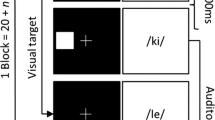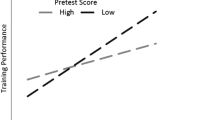Abstract
Working memory (WM) training has been shown to increase the performance of participants in WM tasks and in other cognitive abilities, but there has been no study comparing directly the impact of training format (individual vs. group) using the same protocol. Therefore, the aim of this study was to compare the efficacy of the Borella et al. three session verbal WM training offered in two different formats on target and transfer tasks. This study was conducted in two waves. In the first wave, participants were randomized into individual training (n = 11) and individual control conditions (n = 15). In the second wave, participants were randomized into group training (n = 16) and group control conditions (n = 17). Training consisted of three sessions of WM exercises and participants in the active control condition responded to questionnaires during the same time. There was significant improvement for both training conditions at post-test and maintenance at follow-up for the target task, other WM tasks, processing speed, and executive functions tasks. The ANOVA results showed that the training gains did not depend on the WM training format. However, the effect size analyses suggested that this intervention can be more effective, at short term and follow-up, when provided individually. To conclude, this study showed that providing this training collectively or individually does not change the training benefits, which increases the possibilities of its use in different contexts.

Similar content being viewed by others
References
Cowan N (2008) What are the differences between long-term, short-term, and working memory? Prog Brain Res 169:323–338
Baddeley A (2012) Working memory: theories, models, and controversies. Annu Rev Psychol 63:1–29
Van Geldorp B, Parra MA, Kessels RP (2015) Cognitive and neuropsychological underpinnings of relational and conjunctive working memory binding across age. Memory 23:1112–1122
Simon S, Tusch E, Håkansson K et al (2017) Cognitive changes after working memory training in healthy older adults: evidence from a multi-site, randomized controlled trial (P6. 107). Neurology 88:P6–107
Borella E, Carbone E, Pastore M et al (2017) Working memory training for healthy older adults: the role of individual characteristics in explaining short-and long-term gains. Front Hum Neurosci 11:99. https://doi.org/10.3389/fnhum.2017.00099
Melby-Lervåg M, Redick TS, Hulme C (2016) Working memory training does not improve performance on measures of intelligence or other measures of “far transfer” evidence from a meta-analytic review. Perspect Psychol Sci 11:512–534
Karbach J, Verhaeghen P (2014) Making working memory work a meta-analysis of executive-control and working memory training in older adults. Psychol Sci 25:2027–2037
Zinke K, Zeintl M, Rose NS et al (2014) Working memory training and transfer in older adults: effects of age, baseline performance, and training gains. Dev Psychol 50:304
Carretti B, Caldarola N, Tencati C et al (2014) Improving reading comprehension in reading and listening settings: The effect of two training programmes focusing on metacognition and working memory. Br J Educ Psychol 84:194–210
Cantarella A, Borella E, Carretti B et al (2017) Benefits in tasks related to everyday life competences after a working memory training in older adults. Int J Geriatr Psychiatry 2:86–93. https://doi.org/10.1002/gps.4448
Borella E, Carretti B, Riboldi F et al (2010) Working memory training in older adults: evidence of transfer and maintenance effects. Psychol Aging 25:767
Borella E, Carretti B, Cantarella A et al (2014) Benefits of training visuospatial working memory in young-old and old-old. Dev Psychol 50:714
Carretti B, Borella E, Zavagnin M et al (2013) Gains in language comprehension relating to working memory training in healthy older adults. Int J Geriatr Psychiatry 28:539–546
Brum PS, Borella E, Carretti B et al (2018) Verbal working memory training in older adults: an investigation of dose response. Aging Mental Health 24:81–91. https://doi.org/10.1080/13607863.2018.1531372
Verhaeghen P, Marcoen A, Goossens L (1992) Improving memory performance in the aged through mnemonic training: a meta-analytic study. Psychol Aging 7:242
Folstein MF, Folstein SE, McHugh PR (1975) Mini-Mental State: a practical method for grading the cognitive state of patients for clinician. J Psychiatr Res 12:189–198
Brucki SM, Nitrini R, Caramelli P et al (2003) Sugestões para o uso do mini-exame do estado mental no Brasil. Arquivos de Neuro-psiquiatria 61:777–781
Lamberty GJ, Kennedy CM, Flashman LA (1995) Clinical utility of the CERAD word list memory test. Appl Neuropsychol 2:170–173
Bertolucci PHF, Okamoto IH, Brucki SMD et al (2001) Applicability of the CERAD neuropsychological battery to Brazilian elderly. Arq Neuropsiquiatr 59:532–536
Yesavage JA, Brink TL, Rose TL et al (1983) Development and validation of a geriatric depression screening scale: a preliminary report. J Psychiatr Res 17:37–49
Paradela EMP, Lourenço RA, Veras RP (2005) Validation of geriatric depression scale in a general outpatient clinic. Revista de Saúde Pública 39:918–923
Pachana NA, Byrne GJ, Siddle H et al (2007) Development and validation of the Geriatric Anxiety Inventory. Int Psychogeriatr 19:103–114
Massena PN, de Araújo NB, Pachana N et al (2015) Validation of the Brazilian Portuguese version of geriatric anxiety inventory–GAI–BR. Int Psychogeriatr 27:1113–1119
Pfeffer RI, Kurosaki TT, Harrah CH et al (1982) Measurement of functional activities in older adults in the community. J Gerontol 37:323–329
Sanchez MA, Correa PCR, Lourenço RA (2011) Cross-cultural adaptation of the “Functional Activities Questionnaire-FAQ” for use in Brazil. Dement Neuropsychol 5:322–327
Altman DG, Bland JM (1999) How to randomize. BMJ 312:703–704
De Beni R, Palladino P, Pazzaglia F et al (1998) Increases in error errors and working memory deficit of poor comprehenders. Q J Exp Psychol A Hum Exp Psychol 51:305
Brum PS, Borella E, Carretti B et al (2018) Categorization working memory span task: validation study of two Brazilian alternate versions. Int J Geriatr Psychiatry 33:652–657
Wechsler D (1997) Wechsler adult intelligent scale-, 3rd edn. Harcourt Assessment, San Antonio, TX
Nascimento E (2004) Adaptação, validação e normatização do WAIS-III para uma amostra brasileira. In: Wechsler D (ed) WAIS-III: Manual para administração e avaliação. Casa do Psicólogo, São Paulo, SP, pp 161–192
Wilde NJ, Strauss E, Tulsky DS (2004) Memory span on the Wechsler scales. J Clin Exp Neuropsychol 26:539–549
Brucki SMD, Rocha MSG (2004) Category fluency test: effects of age, gender and education on total scores, clustering and switching in Brazilian Portuguese speaking subjects. Braz J Med Biol Res 37:1771–1777
Golden CG, Freshwater SM (1978) Stroop color and word test: a manual for clinical and experimental uses. Stoelting Co, Chicago, IL
Cantarella A, Borella E, Carretti B et al (2017) The influence of training task stimuli on transfer effects of working memory training in aging. Psychologie Française
Cohen J (1988) Statistical power analysis for the behavioral sciences. Lawrence Erlbaum, Hillsdale, NJ, US
Cuenen A, Jongen EM, Brijs T et al (2016) Effect of a working memory training on aspects of cognitive ability and driving ability of older drivers: merits of an adaptive training over a non-adaptive training. Transp Res Part F Traffic Psychol Behav 42:15–27
Guye S, Von Bastian CC (2017) Working memory training in older adults: Bayesian evidence supporting the absence of transfer. Psychol Aging 32:732
Kray J, Fehér B (2017) Age differences in the transfer and maintenance of practice-induced improvements in task switching: the impact of working-memory and inhibition demands. Front Psychol 8:410
Mitolo M, Borella E, Meneghetti C et al (2017) How to enhance route learning and visuo-spatial working memory in aging: a training for residential care home residents. Aging Mental Health 21:562–570
Buschkuehl M, Jaeggi SM, Hutchison S et al (2008) Impact of working memory training on memory performance in old-old adults. Psychol Aging 23:743
Heinzel S, Schulte S, Onken J et al (2014) Working memory training improvements and gains in non-trained cognitive tasks in young and older adults. Aging Neuropsychol Cognit 21:146–173
Funding
Coordenação de Aperfeiçoamento de Pessoal de Nível Superior (CAPES, project number 141031/2014).
Author information
Authors and Affiliations
Corresponding author
Ethics declarations
Conflict of interest
Dr. Paula Brum received financial support from Coordenação de Aperfeiçoamento de Pessoal de Nível Superior (CAPES, project number 141031/2014). No other authors have any conflicts of interests or sources of funding to disclose.
Ethical approval
This study was carried out according to international ethical standards (Helsinki Declaration) and was approved by the ethical committee of the local university (Process number 141031/2014).
Informed consent
The patient involved in this case was appropriately consented for this publication using the institution’s policy for media consent.
Additional information
Publisher's Note
Springer Nature remains neutral with regard to jurisdictional claims in published maps and institutional affiliations.
Rights and permissions
About this article
Cite this article
Brum, P.S., Borella, E., Carretti, B. et al. Working memory training format in older adults: individual versus group sessions. Aging Clin Exp Res 32, 2357–2366 (2020). https://doi.org/10.1007/s40520-019-01468-0
Received:
Accepted:
Published:
Issue Date:
DOI: https://doi.org/10.1007/s40520-019-01468-0




